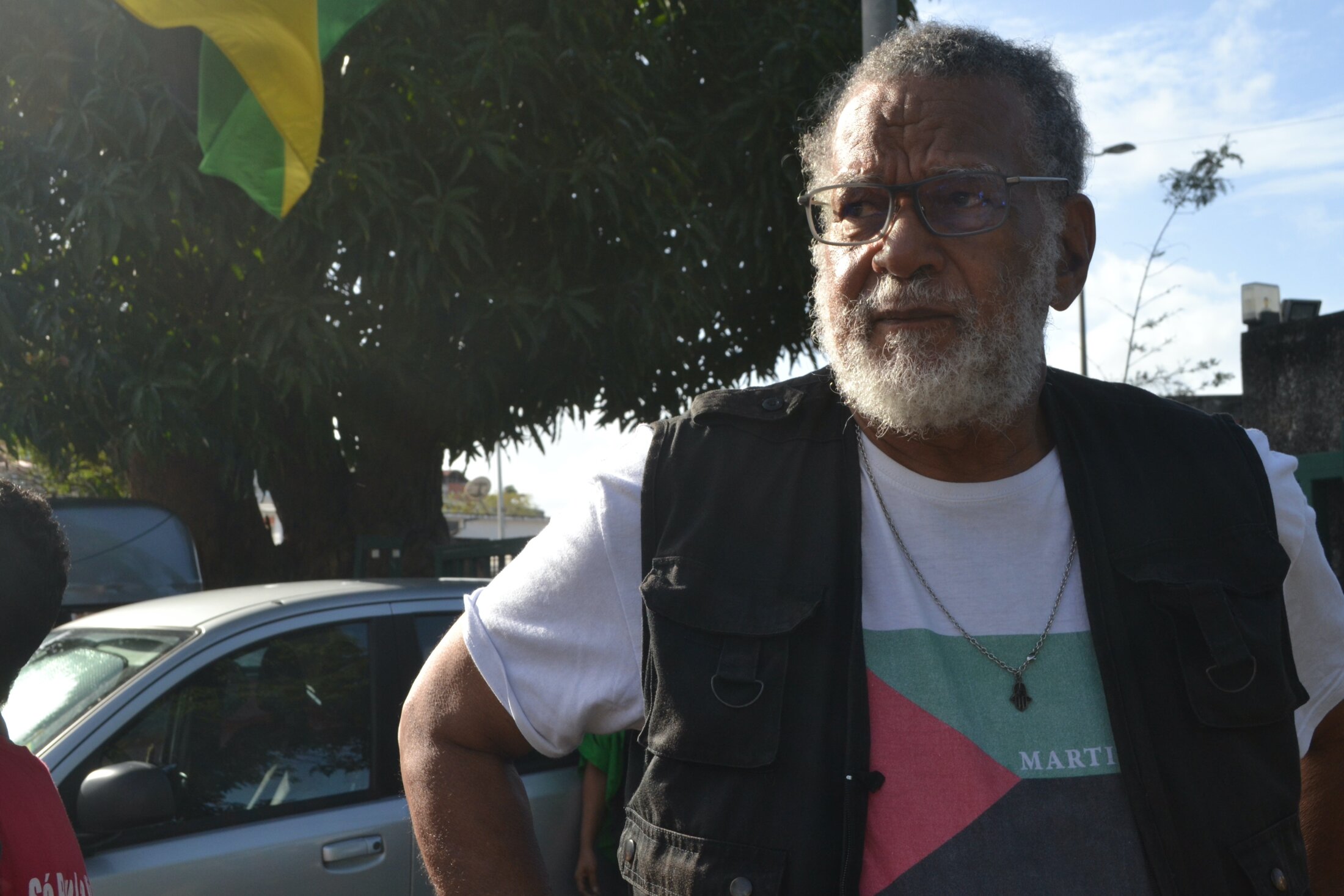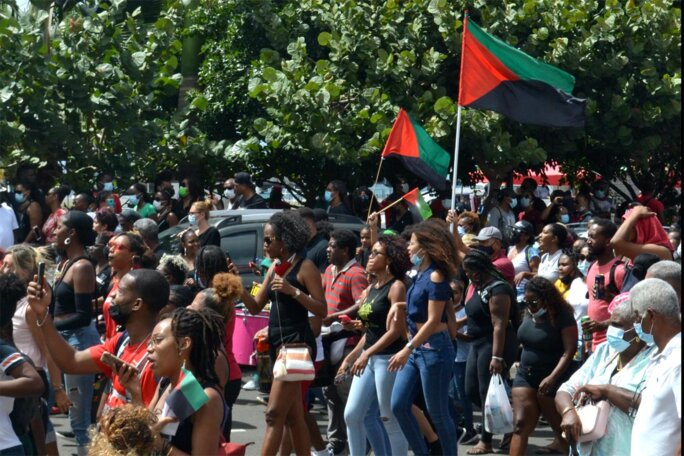It is brandished at each demonstration, lends its name to an anti-pesticide and independence movement, and has become a symbol of radical gatherings. And now this 'red, green and black' flag is the official banner for the French overseas territory of Martinique. After an online consultation with the Caribbean territory's inhabitants – thanks to a decision by the local authority and despite some stormy debates - in February 2023 this nationalist flag was chosen to represent the island.
The flag itself was designed by two fervent supporters of independence for the French département or local administrative area: Alex Ferdinand and Guy Cabort-Masson, activists from the Union Générale des Travailleurs de la Martinique (UGTM) trade union. For them, the red in the design represents social revolution, green stands for the agricultural struggle locally against the use of pesticides, while black is for solidarity with the island's racialised peoples.
“[This official status accorded to the 'red, green and black'] is a matter of great satisfaction for the pro-independence, patriotic and progressive organisations who, after more than fifty years, have seen the flag that we designed adopted by elected representatives, town halls, the people and even at some religious events,” says Alex Ferdinand. “It's clear that a sense of nation is emerging in Martinique, I'd even say it's undeniable!”

Enlargement : Illustration 1

The island's local authority, the Collectivité territoriale de Martinique (CTM), whose president is Serge Letchimy of the Parti Progressiste Martiniquais party founded by the celebrated poet and politician Aimé Césaire, is in no doubt about this. After the vote on the flag, the local authority also tried via another adopted text to make 'kreyol' – Martinique's French-based creole language – the 'official language' alongside French. But they did not bargain for the resistance of the French authorities; the prefect – the local state representative – challenged the move in the courts. The legal challenge was dismissed at first instance but that ruling is now subject to an appeal.
The reason the French state took the the CTM to court is because the issues at stake go further than symbols such as the flag and language. Having launched a formal appeal from Fort-de-France to “change the relationship with France”, political leaders from other French overseas territories such as La Réunion, Mayotte, Guadeloupe and French Guiana as well as Martinique have twice attended meetings at the Élysée.
Changing the island's status in the French Constitution
In Fort-de-France itself, elected representatives from across the island have met in a special congress and begun to put together proposals to get the territory's status changed in the French Constitution. “In terms of which of the Constitution's articles to modify, there are several possible scenarios,” says CTM president Serge Letchimy. “First of all there's the merging of the two articles 73 [editor's note, which sets the relationship between France and its overseas départements] and 74 but I don't favour that option. We could also be brought under article 74, which governs the relationship between France and the very autonomous authorities of Oceania: the people of Martinique have already rejected that option once and I don't see how it can work.”
This highlights the paradox confronting those in Martinique and nearby Guadeloupe who wish to change these islands' status within the Constitution. After the huge demonstrations and the pre-insurrectionary feeling that swept the French Caribbean in 2009, a referendum the following year on a possible change in constitutional status was lost by those backing greater autonomy. It was at that time that the old demons of French policy in these overseas territories re-emerged.
From the 1940s onwards, as far as the departmental elected representatives who “passed on the government's actions locally” were concerned, the “fight” to maintain a departmental system has “seemed like a civilisational issue”, wrote Sylvain Mary, a history professor at the Sciences Po-Saint-Germain-en-Laye political science institute near Paris, in his work Décoloniser les Antilles. Une histoire de l’État post-colonial (1946-1982), published by Sorbonne-Université Presses in 2021. The Caribbean islands of Guadeloupe and Martinique – like La Réunion in the Indian Ocean and French Guiana on the South American mainland - were accorded the status of French départements in 1946, meaning they were governed in the same way as regions in mainland France. The three islands and French Guiana were then collectively known as the “old colonies”. During the Cold War the government in Paris kept a close eye on them all.
“Since the adoption of departmental status in 1946 there have been very few attempts at institutional change and even fewer actual changes,” said Sylvain Mary when contacted by Mediapart. “In 1983 the main attempt, led by the socialist government under [prime minister] Pierre Mauroy [editor's note, the president was François Mitterrand], which sought greater decentralisation than in [mainland] France, came up against the conservatism of the Conseil Constitutionnel [editor's note, the body that rules on whether legislation conforms with the French Constitution]. Thus far the Antilles [editor's note, the French Caribbean] – just like La Réunion and French Guiana – have not really emerged from the assimilationist framework set out in 1946.”
The most advanced model is the status of New Caledonia. It goes a long way towards autonomy. It's a model that is currently interesting Corsican nationalists.
With the elected representatives' congress planning to meet again this November, and with a panel of experts due to be appointed by President Emmanuel Macron in order to collate the proposals for constitutional change country by country, how far could this current process go?

Enlargement : Illustration 2

“The most advanced model is the status of New Caledonia,” is Sylvain Mary's response. “That was established under a specific heading in the Constitution and is based on an organic law which also defines the division of competencies between the state and local government. It's a unique case because it confers the status of citizen of New Caledonia, reserving participation in regional elections to them, and at the same time giving them preferred access locally to state sector jobs. It goes a long way towards autonomy. It's a model that is currently interesting Corsican nationalists.”
Aside from the legal issues – the dream of having one's own language
The quibbling of experts over constitutional law and the battles between politicians concerning articles of the French Constitution do not excite the passions of most people in Martinique and Guadeloupe. However, the concrete consequences of the position that these two islands occupy in the French Republic do interest the hundreds of thousands of citizens affected. The issue of the creole language, for example, is now discussed far beyond the confines of Martinique's administrative courtroom and local authority debating chamber.
Indeed, in Paris the artist and producer Alexia de Saint-John's, who is of Martinique origin, is organising the very first Kreyol International Film Festival. “Our children have French as their mother tongue and our culture is being lost,” she complains. “As for film and audiovisual production, we have 75 years to make up because overseas [territories] were excluded from the system of public financing of the cinema by the 1946 law creating the départements,” she says. “A document in the [French state's] Journal Officiel in 1948 rammed this home, making it clear that aid for the film industry was reserved for the mainland and the Union Française [editor's note, a political entity that replaced the old colonial system] which no longer exists. It was a way of institutionalising domination: we've never left colonisation.” Out of the 17 films competing in the Kreyol International Film Festival, seven have kreyol as the original language.
---------------------------------------------------------------------------
- The original French version of this article can be found here.
English version by Michael Streeter


